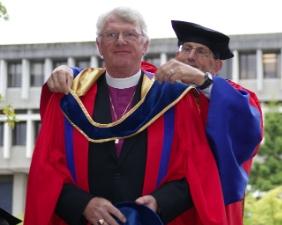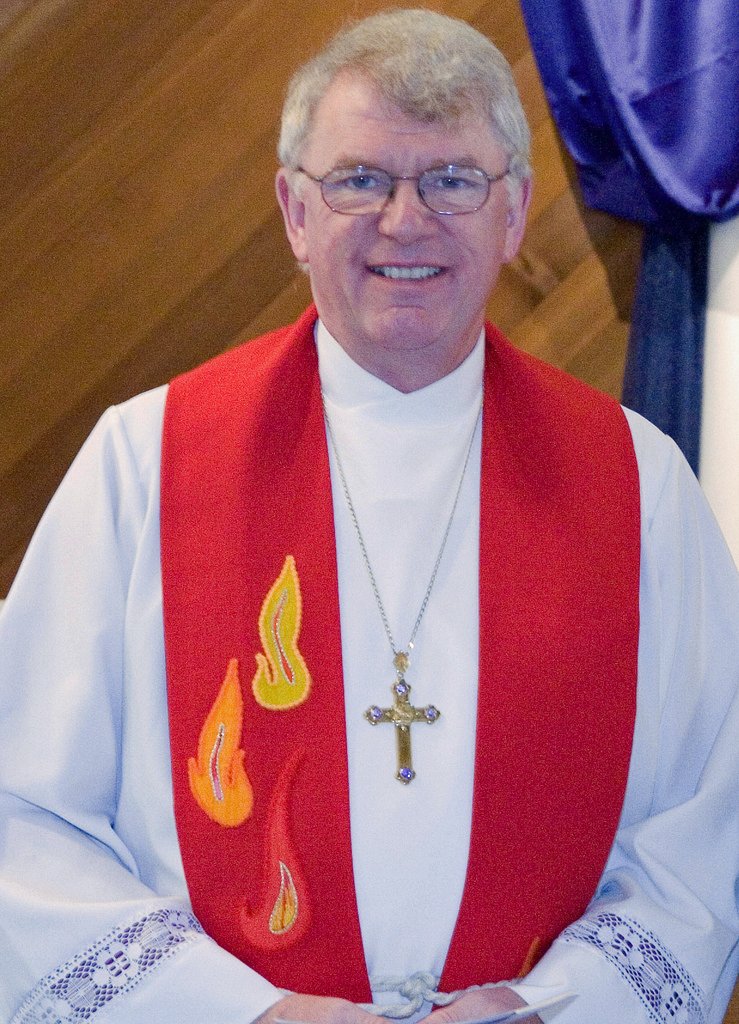
Michael Ingham, the Bishop of New Westminster, receives his honorary doctorate of laws hood from Simon Fraser University in Burnaby, BC, June 14. Credit: Jeremy Hainsworth photo
The Anglican bishop who pioneered the church’s blessing of same-sex unions urged Simon Fraser University graduates to stand up for the rights of gay, lesbian and transgender people as he was granted an honorary doctorate of laws by the British Columbia school June 14.
Michael Ingham, the Bishop of New Westminster, joins religious leaders Bishop Desmond Tutu and the Dalai Lama as honorary degree recipients from the university.
“Religion must work for the equality of women,” Ingham told the convocation. “Religion must uphold the dignity of gay, lesbian and transgender people. Religions must work together, not against each other.”
Ingham was nominated as Xtra Vancouver’s (known as Xtra West at the time) Straight Ally of the Year in 2008 for his unwavering support of gay rights in the face of international criticism.
It was Ingham’s decision in 2002 to bless same-sex pairings – which began at St Paul’s Anglican Church in Vancouver’s West End – that sparked a rift in the worldwide Anglican Communion on the issue.
Parishes in the Vancouver region split from the diocese, sparking court battles over church property.
The head of the 80-million-member church, the Archbishop of Canterbury, called the move “schismatic” and said it “undermines marriage” and “makes us a very embarrassing partner in ecumenical circles as well.”
Ingham was presented with the honorary degree by university president Andrew Petter and Reverend Victor Thomas, who said the bishop has contributed to the liberalization of the worldwide Anglican Communion.
Thomas described Ingham as a “true servant” to many in Vancouver and around the world. He called the longest-serving Canadian bishop a man of courage.
Thomas said Ingham has been profiled by The New York Times for his stance on gay marriage, was named by Britain’s Daily Telegraph newspaper among the 25 “most influential Anglicans in the world” in 2008, and was named by Maclean’s magazine in 2003 as the third most significant newsmaker of that year, after former prime minister Paul Martin and former Vancouver mayor Larry Campbell.
The reforms led by Ingham that won him those accolades were acceptable to many church members in North America and Britain but were denounced by most Anglican bishops in Africa and other developing areas.
In his address to graduates, Ingham exhorted them to be leaders in whatever field they choose.
“Be principled and ethical,” he said. “Be compassionate.”
Ingham also warned of the dangers of religious fundamentalism. “We live in an age when religious fundamentalism is growing,” he said. “It is a movement rooted in fear.”
The bishop urged graduates to commit themselves to taking risks and to working for the “triumph of hope.”
In November 2009, Justice Stephen Kelleher ruled that millions of dollars worth of land and buildings – claimed by four dissident parishes opposed to Ingham’s stance for same-sex blessings – would remain with the diocese.
The four plaintiff churches argued that Ingham and the diocese had “departed from the traditional teaching of the Anglican Church on issues of human sexuality,” Kelleher wrote. “That traditional belief, representing the teaching of the Christian Church for 2000 years, is that sexual relations belong only in a faithful marriage between a man and a woman. Orthodox Anglicans believe that to go beyond treating homosexual persons with understanding and concern and to bless homosexual unions is to countenance same-sex unions as a gift from God.”
“The plaintiffs view this as an abandonment of Christian Scripture, and their respective congregations have left the diocese as a consequence,” Kelleher noted.
The four parishes sought episcopal oversight elsewhere and unsuccessfully claimed the land and buildings as theirs in the court action.
Ingham invited the dissident parishes to return.
“My prayer is that we might all put this sad conflict behind us and get on with the mission of Jesus Christ. No good is served by bitterness or triumphalism,” Ingham said at the time.
“We are here to serve the mission of God and the well-being of all God’s children.”
As far back as 2001, Ingham was clearly torn by the rift.
“I feel myself to be in a Church where theology has become a grim and humourless affair, a struggle not for truth, but for power, characterized at its worst by superficial analysis, threats and personal attacks,” he told a national Anglican conference in Langley, BC.
“Liberals accuse conservatives of lacking compassion, a charge that I reject. Conservatives accuse liberals of abandoning orthodoxy and scripture, a charge I equally reject,” he said.
Ingham, who immigrated to Canada from the English county of Yorkshire, was elected Bishop of New Westminster in 1993.
He studied at the University of Edinburgh, Harvard and the Hebrew University in Jerusalem.
He is due to retire in August.
“It’s time to hang up my mitre, park the shepherd’s staff, pull the ruffles off my fancy sleeves and go play golf,” Ingham wrote in his resignation letter to BC Metropolitan John Privett, of the Diocese of Kootenay.

 Why you can trust Xtra
Why you can trust Xtra


